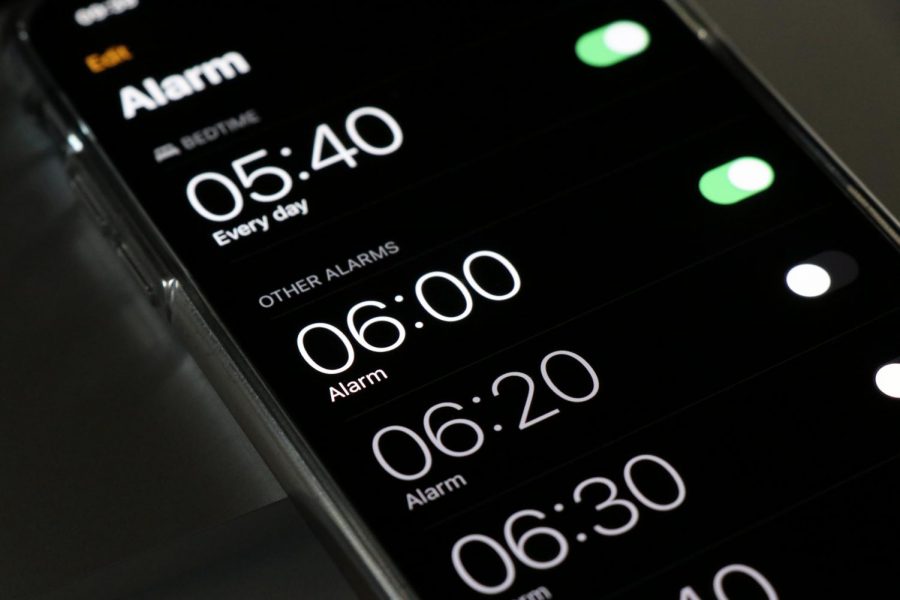Worldwide Issue of Sleep Deprivation
ALARMS, ALARMS, AND MORE ALARMS: People need constant blaring reminders on when to wake up. If sleep were to be maintained properly, there would be no use for such a thing.
December 4, 2019
The common issue of sleep deprivation in people, especially teens, creates a toxic mindset with little ability to focus and perform at an efficient level. Recommended hours of sleep are eight to ten hours for children and teens, seven to nine hours for young adults and six to eight for mature adults. However, the average amount of sleep for Americans every night is six hours for all age groups, which is not healthy for most people. Resulting effects of not enough sleep can be serious mental and physical diseases, as well as cardiovascular issues. The group of people mainly effected by sleep deprivation are teenagers. Main causes of this are cell phones, sports, extra-curricular activities, and homework.
These things cause constant thoughts in a person’s mind, effecting their true ability to close their eyes and get solid Rapid Eye Movement sleep. REM sleep is when there is an increase in brain activity, eye movement, muscle relaxation and an acceleration in respiration. In addition, there is non-REM sleep which is dreamless sleep. During NREM sleep, brain waves are typically slow and of high voltage, the breathing and heart rate are slow and regular while the blood pressure is low, and the sleeper is relatively still. Non-REM sleep typically occurs when a person in in deep sleep, which usually happens based on how fatigued the person had been when initially falling asleep. The reason these two types of sleep are important is because people who don’t experience both cycles multiple times during a night of sleep will gradually become sleep deprived the more this occurs. Overall, people (especially teenagers) are suffering from sleep deprivation which needs to be changed. Whether that is habits we have before or after sleeping, something needs to be done.
Young adults should experience four to five sleep cycles every night. Each sleep cycle should last 90 minutes. Overall, that accumulates for seven to nine hours per night. When you reach stage five of your sleep, you are experiencing REM sleep, and when you reach stage three, you are in non-REM sleep. Good, healthy sleep is important for the human body because while you sleep, your mind and body release toxic chemicals and regulate mental energy, mood and acuity. Therefore, sleep deprived people gather far less information than others with good sleeping habits and they are not as emotionally stable.
Since teenagers are primarily being affected by this issue, studies show teens’ overuse of cell phones, excessive extra-curricular activities and other factors prevent kids from getting pure beneficial sleep. Sophomore Dominic Giustino said, “On average I get about six hours of sleep every night depending on if I have baseball and or a lot of homework after school.” Six hours of sleep is very minimal and when you only get six, you are not able to function properly during the day. Not only will you have a tired physical feeling, but you will feel mentally exhausted as well. Junior Beverly Vazquez said, “Homework and hanging out with friends are two main priorities I have after the school day ends.” Even though students have required tasks to complete such as homework and other assignments, they also must stay committed to prior obligations outside of school. The more tasks that pile up on their plates, the less time there is for sleep.
Sleep, food and water all go hand in hand in terms of things you must have to live and stay healthy. The more sleep you get, the greater the chance you have at a long lifespan and smaller chance of developing certain mental diseases. Sleep loss creates serious disadvantages in perception and judgement, meaning students will have a harder time learning and focusing in class. Freshman Kyree Sheffield said, “It’s definitely a struggle to focus and pay attention in class when I am tired because all I can think about is trying to get sleep and I can’t get work done.” Overall, the lack of sleep has detrimental effects on students’ learning abilities, and it can be changed. Since homework is sometimes a burden on students, teachers can allow time in class to do things such as study and complete assignments for classes that students could not finish outside of school for whatever reason. Senior Lauren Koper said, “Sleep gives you a major energy boost and is a necessity for me to be able to try my best and give full participation during the day. When I don’t sleep well, I don’t feel like myself and I lose confidence.” In addition to not be able to perform, students will lose belief in themselves to complete tasks and they will not want to participate in the classroom anymore because of it.
All negative effects of sleeping can be stopped by allowing more time for yourself and simply managing your time. Although it may be easier said than done, once you get in the habit of getting the right amount of sleep, that habit will become an everyday thing your body is accustomed to. It will help relieve stress, prevent dangerous health issues and help you feel like yourself every time you get up in the morning.




